Special for the Armenian Weekly
A pair of modest, worn-out pumps accompanied 31-year-old Inesa’s words: “My husband always says that I’m an absurd and useless woman.” Five years after 20-year-old Zaruhi Petrosyan was beaten to death by her husband, the Coalition to Stop Violence Against Women observed a National Day to Combat Domestic Violence in Yerevan’s Republic Square with a public display of 60 pairs of shoes, representing the victims of domestic violence since Zaruhi’s death on Oct. 1, 2010.
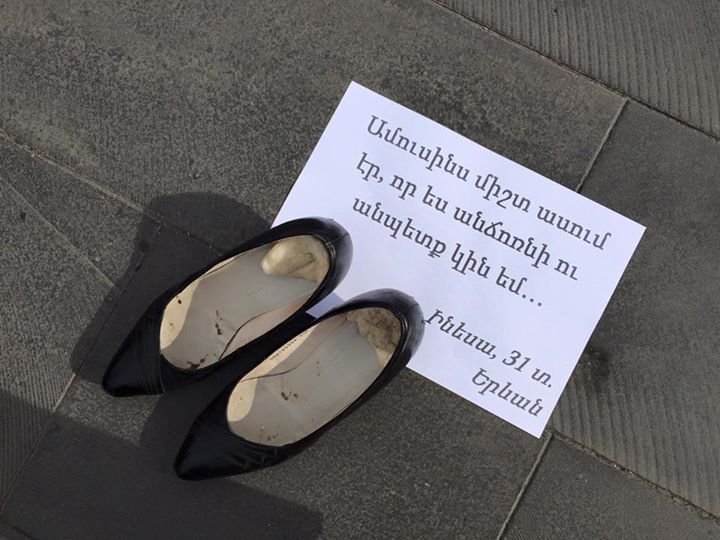
For Lara Aharonian, the director of the Women’s Resource Center Armenia, Oct. 1 is a symbolic day—“[It is the day] we woke up with the news of a young woman killed after severe beatings,” she told the Armenian Weekly. “The death of Zaruhi affected everyone—she became the poster child of the fight against domestic violence. She was not the first but she was the one everyone talked about.”
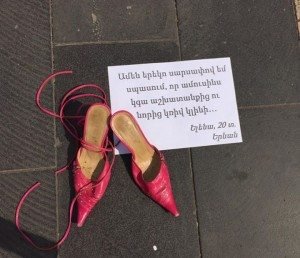
In October 2010, the news of Zaruhi’s murder spread through Armenia and the diaspora. The brutality of her death, and the unwillingness of the police to assist her prior to her murder, shook the Armenian world.
“On that day we started our fight together as a coalition—we joined our efforts for the first time with seven NGOs to raise awareness, support the victims, and lobby for [the domestic violence] law,” said Aharonian.
Zaruhi was an orphan, neglected by society, her rights considered irrelevant by some. Those factors contributed to the perpetuation of the abuse she was subjected to. The law and society had failed her.
In the wake of Zaruhi’s murder, organizations advocating for women’s rights came together to form the umbrella group known as the Coalition to Stop Violence Against Women. The seven NGOs comprising it are the Women’s Resource Center; Women’s Support Center; Women’s Rights Center; Society Without Violence; PINK Armenia; Real World, Real People; and the Sexual Assault Crisis Center of Yerevan.
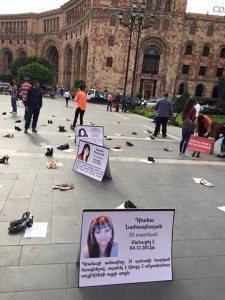
Coming together to form the coalition was “a kind of promise, a pledge to Zaruhi,” said Aharonian, adding that Oct. 1 became a day to remember Zaruhi, to reflect, and to renew the efforts needed to put an end to domestic violence.
And so, this year, the coalition placed 60 pairs of shoes in Yerevan’s Republic Square. Each pair was accompanied by the testimony of a real victim of domestic violence.
“He won’t let me leave the house alone… These walls are beginning to weigh down on me,” read one statement that accompanied a pair of tan suede boots.
“Every evening I wait in fear for my husband to come home from work and start a fight,” read the testimony of a 20-year-old woman named Yelena. Hers were strawberry-colored pointed shoes.
And then there were the pair of tiny pink shoes, and the words of 8-year-old Mariam, “I couldn’t study. Dad got angry, and struck me in the face. Blood came out my nose…”
A poster featuring the silhouette of a woman and a question mark read, “Who will be next?”
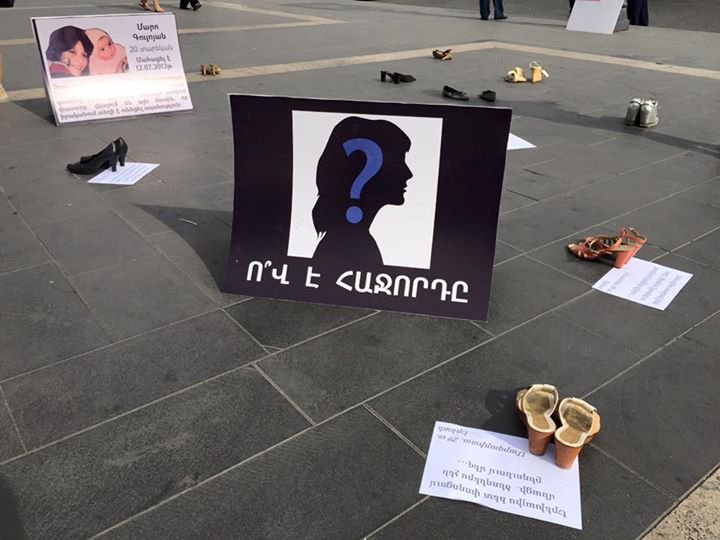
“We wanted to show how real people have suffered from domestic violence. So the empty shoes symbolize the life that is no more, the missing women. People were able to feel that absence, emptiness, and loss that the deceased leave behind. These were 60 shoes symbolically belonging to different women killed since the death of Zaruhi…showing that we need to do more, that we need to pass the law,” said Aharonian.
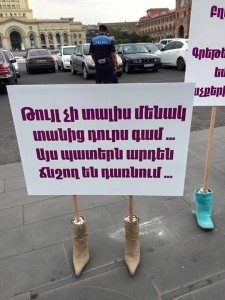
Between 2013 and 2015, more than 5,000 calls have been made to domestic violence hotlines operated by 3 NGOs, Susanna Vardanyan of the Women’s Rights Center was quoted as saying by MediaCenter.am, during a press conference held on Oct. 1.
Vardanyan noted that 30 women were killed as a result of domestic violence during that same period, leaving 45 children behind. During the first 9 months of this year, more than 2,000 cases of domestic violence were reported to the coalition. The police reported 535 cases of domestic violence this year, including cases of child abuse. According to the police department, there has been a decrease in the number of cases, as well as in the number of deaths resulting from domestic violence.
Yet, Lida Minasyan of the Society Without Violence stressed that the real number of domestic violence cases is much higher, if one considers that there are many instances where the abuse is not made public or reported. Women in rural areas, she said, are particularly vulnerable.
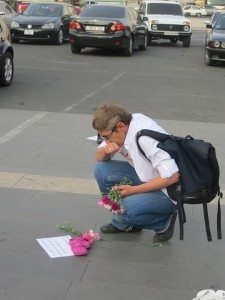
Since Zaruhi’s murder, the coalition has fought hard to pass a domestic violence bill, so far to no avail. Currently, a draft bill is awaiting examination in the National Assembly. Activists say a separate domestic violence bill will acknowledge the crime and allocate financial and human resources, as well as services, to both prevent it and address the consequences. Such a law—which activists have advocated for around a decade—would encompass protection mechanisms, from restraining orders to police and judicial reforms, to effectively deal with the crime.
In the afternoon of Oct. 1, the coalition held a protest action in front of the government building, demanding passage of domestic violence legislation. In the evening, the organizers held a candle light vigil in memory of victims of abuse in Armenia and around the world.
Meanwhile, the reaction to the public shoe display showed the spectrum of attitudes to domestic violence in Armenia. According to Aharonian, the reaction from passersby varied. Some were supportive. “We had people getting emotional while reading the stories. Some even placed flowers on [the shoes],” said Aharonian. Others reacted aggressively by blaming the victims or justifying the abuse.
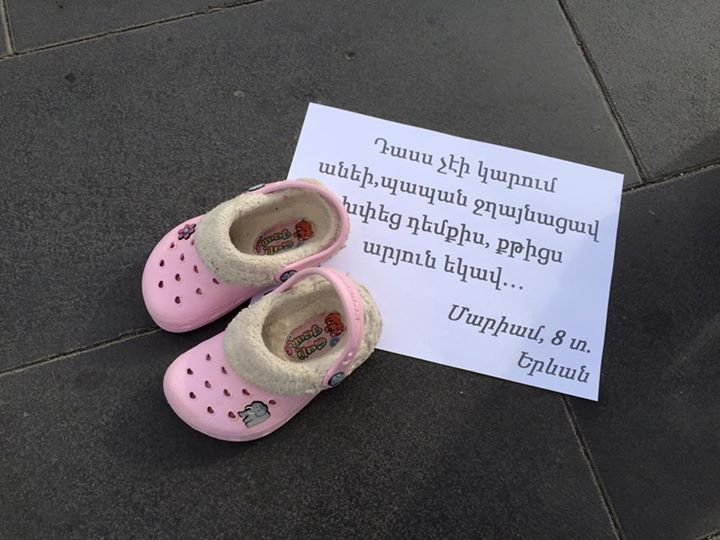


Please telle me how can i help? Thank You
Those men’s that they are abusing their wife and children, shall be tie them up to tree and bitten with wood stick.
They don’t deserve to have life partners.
Arsen Hambarsoomian
Any light in the tunnel regarding the domestic violence legislation? What are some of the reactions from the government legislators? Are there any negotiations going on?
Any such child and spousal abuse is inexcusable and, without a doubt, the victims have to be protected under the law. However, I think what’s missing from these reports is a few words about the lives and educational backgrounds of the individuals, the victim and the abuser, involved in these tragic events. I say this because it seems, to me at least, that there is some sort of disconnect between these individuals to treat one another in such inhumane manner. I wonder if in many of these cases these individuals became couples at a very young age without knowing each other well or perhaps they were coaxed or even obligated to marry people they knew very little about and were incompatible and did so because of some social stigma attached to their situations. There is no excuse for abuse whatsoever but it is hard to tell what the root causes of these unfortunate tragedies are. Other reasons could be economic and financial related. Much worse is when the woman is completely dependent on the husband and feels trapped.
This article by Nanore is gut wrenching, heart breaking and emotionally most disturbing.
“Who will be next?”- what a soul piercing poster. There should not be any nexts.
– What is wrong with the members of the National Assembly?
– Why is it so hard to pass a domestic violence bill?
– How can any decent human being blame the victim or justify the excuse?
– Why such suffering by defenseless women cannot be stopped?
This is incredibly sad.
Vart Adjemian
It will require changing of attitudes and participation of men as well. It will take some time but attitudes can and do change. Support from the police is also important since they are the lawful force which can intervene in domestic violence.
To change things, it will take facing up to this issue openly, and that’s not an easy thing to do.
This little sign of awakening against domestic violence is 100 years late! And when there is domestic violence there is not 1 pair of shoes that becomes a victim there are at least 10 more!!!
“Between 2013 and 2015, more than 5,000 calls have been made to domestic violence hotlines operated by 3 NGOs,”
“Vardanyan noted that 30 women were killed as a result of domestic violence during that same period, leaving 45 children behind.”
This is just too hard to read.
It takes time to change habits, they say. The question is, why has this become an established pattern in our country in the first place? Aren’t we supposed to be Christians? We boast to everyone who would listen how we are the first Christian nation in the world – but do we live it? Aren’t Christian men supposed to cherish their wives? “Husbands should love their wives as their own bodies. He who loves his wife loves himself.” Live with your wives in an understanding way, showing honor to the woman… so that your prayers may not be hindered.” It’s right there in the Bible…
Mariam, this has nothing to do with religion. Same way, many of us think that we share European values because unlike our neighbours, we celebrate Christmas and Easter; sorry but we’re not Europeans. We are indigenous peoples from Asia Minor, and our habits have been influenced by the people who have occupied our lands and governed us for centuries. The solution to this issue lies in education. More education opens up your mind and develops your skills for resolving issues via communication, dialog, debate and decision taking by consensus. Taking advantage of the physically weaker gender is the last resort for the coward; and I’m sure these people are quite primitive in their values and are the least educated in society.
It will also take a few generations to change the mentalities of some people in politics, who are supposed to be educated, but some of them resort to beating up even killing their opponents. It is sad, shocking, but only sustained education might change things.
I would like to help too. I am also wondering how many shoes should be there for women abused, but not killed and how many women commit suicide from being abused.
ABUSERS ARE AND WILL STAY ABUSERS, BE IT VERBAL ABUSE, EMOTIONAL ABUSE,FINANCIAL ABUSE OR PHYSICAL ABUSE.WE SHOULD ENCOURAGE YOUNG GIRLS TO PURSUE HIGHER EDUCATION AND BE CAREER ORIENTED AND NOT MARRIAGE ORIENTED AT AN EARLY AGE SO THAT THEY WILL BE FINANCIALLY INDEPENDENT IN THE FUTURE.MOTHERS SHOULD CHANGE THE WAY THEY EDUCATE THEIR SONS SO THAT THEY WILL NOT SEE THEMSELVES AS GOD’S GIVEN GIFT FOR WOMEN.